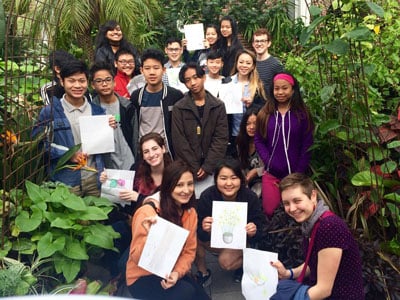 |
|
|
Youth members of the Worcester Refugee Assistance Project with medical students and staff at Tower Hill Botanic Garden. |
Knowing that arts can nurture the soul and bridge cultural differences, a team of UMass Medical School students and Tower Hill Botanic Garden have partnered with the Worcester Refugee Assistance Project to run a series of art, cooking and gardening classes for children resettled from Burma now living in Worcester. The program was featured in the April 19 edition of the Worcester Telegram & Gazette.
“One of the things we really notice with kids when they move from refugee camps to an urban place is they lose that connection to nature,” Courtney Temple, SOM ’17, told the Telegram. Unlike the refugee camps in the deep jungle where they grew up, in Worcester, the youth are removed from nature and occupied with typical American activities, with an intense focus on academic achievement, she said
“Across age ranges, the youth have spoken to us about feeling isolated from nature and community in their new urban environment,” said Temple. “In addition to teaching useful skills that can be applied in the community, our hope is that the agricultural activities will have psycho-social benefits.”
Temple, along with Mark Fusunyan, SOM ’17; Meme Tran, SOM ’19; and Kevin Gao, SOM ’20, developed the series of Saturday sessions with a $500 MLK Semester of Service Award grant from the medical school. The classes are hosted by Tower Hill Botanic Garden in Boylston, whose educators are donating their time to the project. Classes introduce members of the WRAP Youth Group, aged 12 to 19, to horticulture and cooking as both skill-building and therapeutic activities while fostering friendships among the youth and UMMS students.
“Our goal is to develop structured, health-promoting activities,” said Fusunyan. “By introducing the youth to social activities surrounding wellness, we hope to increase their future engagement with similar resources.”
WRAP was co-founded and now directed by Graduate School of Nursing alum Meredith Walsh, MS, MPH, RN, a nurse practitioner at the Edward M. Kennedy Community Health Center in Worcester. WRAP is committed to assisting local refugees from Burma achieve sustainable self‐reliance through mentoring, advocacy and providing material support as needed. UMMS students have collaborated with local health care providers and faculty to establish programs for resettled refugees from Burma since WRAP was established in 2010.
“While the organization focuses on the overarching needs of the community, the youth population has proven to have unique and specific barriers to success,” said Temple. “They face distinct challenges adjusting from life in refugee camps to that in an urban city.”
Fusunyan, Temple, Tran and Gao have long volunteered at WRAP, focused on enhancing support for youth with previous MLK Semester of Service Awards. They established the WRAP Youth Group, which meets weekly, with mentors and volunteers including those from UMMS, pairing recreational activities with educational curricula on nutrition, adolescent health, medical literacy, and STEM careers. The Youth Group has given rise to the WRAP Teen Mentoring Program, pairing UMMS students with teens, as well as the 2016 publication of a book of youth stories entitled When We Were Home. During summer 2016, several youth took part in a community garden project, finding that the process validated their agricultural skills and eased their homesickness. The classes at Tower Hill are providing them with further exposure to gardening, cooking and visual arts during monthly sessions.
“Over the past three years, we have watched our teens grow into community leaders, taking positions on WRAP’s board of directors and serving as ambassadors to broader Worcester,” Fusunyan said. “With our teen cohort transitioning to higher education and employment, we aim to develop programming for the 8- to 12-year-old preteen age range.”
Read the full Worcester Telegram & Gazette story here.
Related stories on UMassMedNow:
MLK Semester of Service Awards announced at annual tribute
From compassionate students to caregivers, newest GHHS members inducted
When We Were Home: Stories by young refugees living in Worcester
Students pursue Martin Luther King’s legacy of service with MLK Semester of Service Awards
Coat drive to benefit Worcester Refuge Assistance Project
Halloween costume drive to benefit refugee children
Empowering a community
Ice time for students and refugees
GSN student helps refugees from Burma build lives in their new country